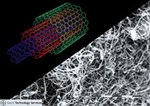New Manufacturing Process Enables Larger Production Volumes

Bayer MaterialScience Plans the Industrial Marketing of Baytubes®
 Leverkusen, Germany — High-quality carbon nanotubes (CNT) for a wide variety of applications can now be manufactured on an industrial scale at considerably lower costs than before. Bayer MaterialScience AG plans to market the nano-sized materials worldwide under the trade name Baytubes®. The new process for manufacturing Baytubes® was developed in collaboration with Bayer Technology Services GmbH, a Bayer Group service company with a wealth of know-how in process technology. Until now, the high price of up to EUR 1,000.00 per kilogram and the fluctuating production quality prevented more widespread use of nanotubes.
Leverkusen, Germany — High-quality carbon nanotubes (CNT) for a wide variety of applications can now be manufactured on an industrial scale at considerably lower costs than before. Bayer MaterialScience AG plans to market the nano-sized materials worldwide under the trade name Baytubes®. The new process for manufacturing Baytubes® was developed in collaboration with Bayer Technology Services GmbH, a Bayer Group service company with a wealth of know-how in process technology. Until now, the high price of up to EUR 1,000.00 per kilogram and the fluctuating production quality prevented more widespread use of nanotubes.
"For the first time, we can achieve consistent material purity of over 99 percent and significantly reduce manufacturing costs," says Martin Schmid, head of the Carbon Nanotubes project at Bayer MaterialScience. "Adding just small quantities of Baytubes® can make a plastic car fender so electrically conductive that it can be painted without any further pretreatment, using environmentally friendly waterborne or powder coatings. In a similar manner, we can make films for antistatic packaging materials, such as those used for sophisticated electronic components." Another possibility is the electromagnetic interference (EMI) shielding of computer and mobile telephone housings. In the future, CNTs could also improve the thermal conductivity of ceramic components in turbines.
"Baytubes® brand carbon nanotubes are multi-walled tubes comprising up to 15 graphite layers. Chemically speaking, the material is identical to pencil lead," explains Dr. Sigurd Buchholz, project head at Bayer Technology Services. "The nanotubes have a maximum mean diameter of 50 nanometers, meaning they're more than 10,000 times thinner than a human hair. If one of these tubes were enlarged to the size of a drinking straw, it would be up to 250 meters long!" Custom-made CNTs with different diameters, lengths and wall thicknesses can be produced for any application by selecting the corresponding catalyst.
The black powder was discovered about 15 years ago and has since turned out to be a highly versatile material thanks to its remarkable properties. It withstands mechanical loads up to 60 times better than steel at only one-sixth the weight. It conducts heat better than diamond. It is insensitive to heat and, depending on the molecular structure, behaves like an electric conductor or semiconductor. The key to these properties is the molecular structure of the nanotubes: the carbon atoms in the tube wall form a uniform, hexagonal lattice, comparable to a honeycomb. This arrangement lends the tubes very high mechanical strength. If the hexagon edges are aligned parallel to the cylinder axis - like in single-walled nanotubes - the material conducts electricity much better than copper. If they are aligned vertically, the materials acts like a semiconductor. Consequently, CNTs are ideally suited for electrodes and high-frequency transistors.
SOURCE: Bayer MaterialScience AG
